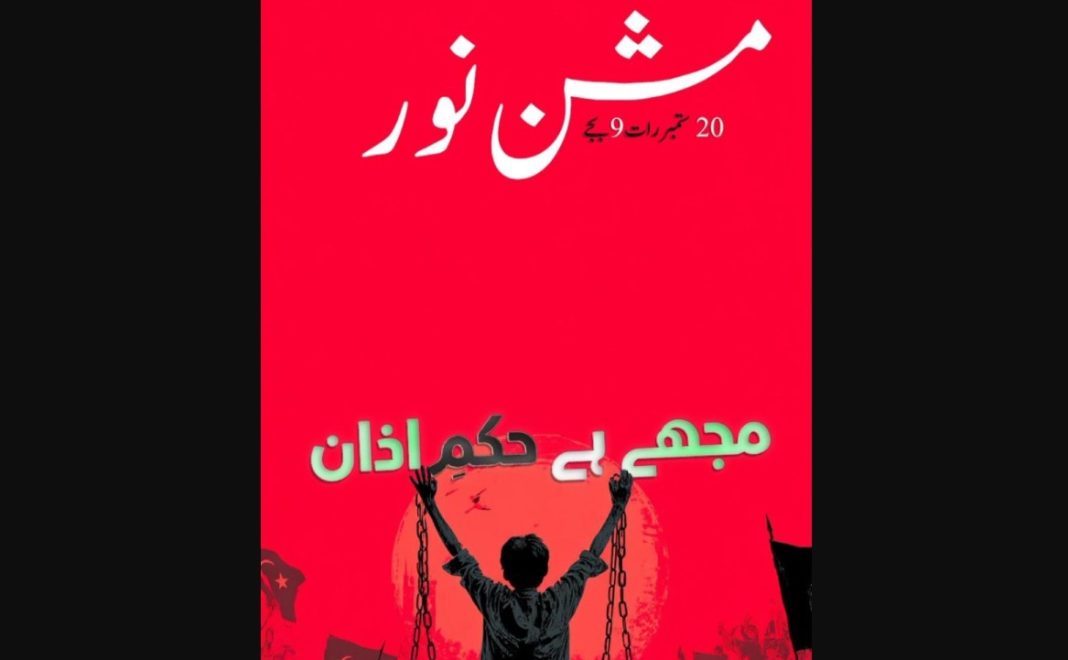A quiet yet powerful call is sweeping across Pakistan under the banner of Mission Noor—a campaign that urges citizens to climb to their rooftops on September 20 at 9 PM and recite the Azan in unison. Framed as both a spiritual awakening and a political act, the movement has unsettled Pakistan’s ruling elite, baffling police and unnerving the establishment.
#MissionNoor by Youth of Pakistan is looking promising. The goal is to plead to Allah to help get rid of the fascist regime in Pakistan! pic.twitter.com/jeSmB2tGbb
— PTI (@PTIofficial) September 17, 2025
A Spiritual Protest Against Injustice
At its core, Mission Noor—“Noor” meaning light—is promoted by Pakistan Tehreek-e-Insaf (PTI) supporters and social media activists as a non-violent, faith-driven stand against what they call a “rigged” political system. Organizers describe it as a way of “pleading to Allah for the release of Imran Khan and an end to Pakistan’s fascist regime.”
Videos, graphics, and messages have gone viral on X, amplifying the campaign. Its leaderless nature has made it difficult for authorities to contain, while its reliance on Azan—a sacred Islamic practice—has put police in a dilemma: how do you suppress this novel idea?
Imran Khan at the Heart of the Movement
Imprisoned since 2023, Imran Khan remains the focal point of Pakistan’s political turmoil. His detention, widely condemned as politically motivated, has become a rallying point for supporters. Amnesty International, in a September 2024 statement, highlighted “fair trial violations under international human rights standards” and called for Khan’s immediate release. Similarly, the UN Working Group on Arbitrary Detention declared his imprisonment unlawful under international law.
#Pakistan #UnitedNations : The UN Human Rights Council’s Working Group on Arbitrary Detention demands that former Prime Minister Imran Khan be released without delay, that he be compensated, and that the government take action against those accountable for violating his rights.… pic.twitter.com/L3MtdilRCg
— International Human Rights Foundation (@IHRF_English) July 1, 2024
Mission Noor draws directly from Khan’s jail messages, blending religious symbolism with political defiance. To many, it is a way to reclaim dignity in the face of state repression; to critics, however, it risks politicizing faith.
Read More: Imran Khan vs. the System: A Nation at Crossroads
Elections Without Credibility
The 2024 general elections, marred by irregularities, further fueled the discontent. Manipulation, voter intimidation, and systematic sidelining of PTI candidates allowed a military-backed PML-N and PPP alliance to take control. Opposition groups pointed out the fraudulent process, and international observers echoed those concerns.
In the United States, Congress introduced Human Rights Resolution 901, condemning Pakistan’s election practices and suppression of dissent. While the resolution signaled concern, the Biden administration has been accused of inaction, prioritizing strategic ties over democratic accountability.
Read More: Pakistan’s Field Marshal: Who Changed the Stars…
Between Hope and Fear
Supporters hail Mission Noor as a symbol of hope—“every rooftop a battlefield of courage, every voice a weapon of truth.” Yet others see risks. Religious scholars have criticized the use of Azan as a political tool, warning it could divide rather than unite. The government, meanwhile, fears that a simple act of prayer might snowball into uncontrollable unrest.
The police, caught in the middle, face an unprecedented challenge. Unlike rallies or sit-ins that can be dispersed, the Mission Noor call is intangible, decentralized, and rooted in faith. To confront it would risk provoking outrage; to ignore it could embolden further defiance.
Whether Mission Noor will transform into a sustained movement or fade after September 20 remains to be seen. For now, it has struck a nerve in a nation where political repression, economic hardship, and disenchantment with the military’s dominance define the public mood.
Pakistani youth’s message is clear: “If we cannot fight them with guns, we will raise our voices in Azan. This is our Noor against their darkness.”
Mission Noor may be prayer, protest, or both—but its resonance has already made it a novel challenge to Pakistan’s rulers, one they cannot easily silence.














